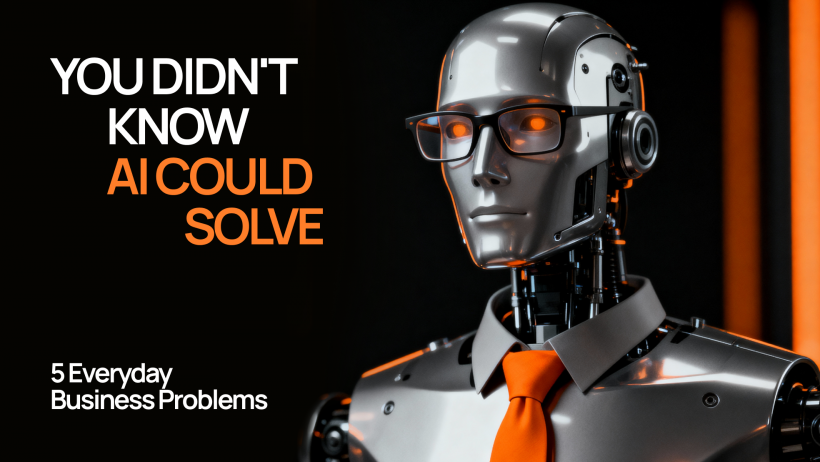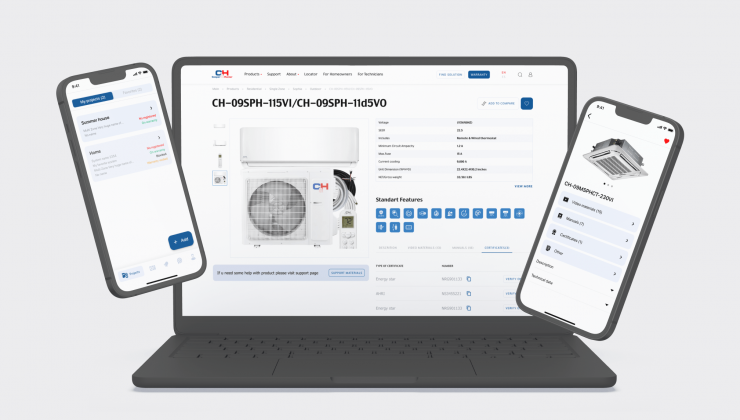Remember when "working late" meant staying until 7 p.m.? Now it means checking support tickets at midnight or reviewing security alerts at 2 a.m. or hunting for fraudulent transactions on Sunday morning. The amount of stuff businesses need to monitor grew exponentially. The number of hours in a day? Still 24.
That's where AI comes in. Not the sci-fi version, but the practical "this saves me 10 hours per week" version. As of 2025, 78% of companies use AI technologies, and most started small. One problem at a time. Here are five problems costing you time and money right now. Problems AI can actually fix.

Boosting Customer Interactions with AI Chatbots
Your customers browse at midnight. Ask questions during lunch. Want answers while you're asleep. Of course it’s impossible to answer them all any minute they contact you.
An AI customer service chatbot means you stop feeling guilty about ignoring messages at 11 PM. It's just there, handling stuff while you watch Netflix.
I know, you might say "chatbots are terrible." The old ones? Yeah. But AI-powered customer support changed a lot.
Context matters now. Someone messaged three days ago about shipping? The bot remembers. Common questions get instant answers. Password resets, order tracking — done in seconds.
And when things get messy, good AI hands it off to humans. The way how AI chatbots improve customer support becomes obvious fast: response times drop from hours to seconds.
Strengthening Security with AI Cybersecurity Tools
Cybersecurity used to be simple. Install antivirus. Don't click weird links. Cross your fingers.
This doesn't work anymore.
Hackers use AI now to find vulnerabilities faster than you can patch them. So you need AI to fight back.
These tools watch everything constantly. Login from Prague at 3 AM when your employee lives in Dallas? Flagged instantly. Someone downloading way more data than usual? System notices.
Traditional security is like a bouncer with a banned list. AI threat detection spots when someone's acting weird before they do anything wrong.
Having a small business you're more of a target because hackers assume weaker defenses. Good news is that the best AI cybersecurity tools for companies give you enterprise-level protection without needing a security team.
Preventing Financial Loss with AI Fraud Detection Software
Fraud costs more than stolen money. There's investigation time, customer trust damage, regulatory paperwork.
AI fraud detection software analyzes thousands of transactions per second, looking for anything off.
Picture this: someone steals a credit card, buys $2,000 of stuff. They spread it across multiple orders so basic fraud rules don't trigger. It looks legit.
Humans might catch this eventually. While different examples show how it spots patterns immediately: same shipping address, similar timing, unusual behavior, device fingerprints. All invisible to real customers.
AI risk management software adapts too. Fraudsters change tactics constantly. And AI learns from every attempted scam, and adjusts automatically.
Transforming Productivity with AI Workflow Automation
How much time does your team waste on stuff that doesn't require human intelligence?
Such as: data entry, meeting scheduling, report generation, chasing approvals.
AI workflow automation handles repetitive stuff. Unlike old automation that breaks when something unexpected happens, AI makes decisions based on context.
| Business Function | Traditional Approach | AI Automation Benefit |
|---|---|---|
| Meeting Scheduling | 20+ emails, calendar Tetris | AI finds optimal times in seconds |
| Data Entry | Hours of manual input | 99%+ accuracy, automated |
| Report Generation | Weekly time sink | Instant real-time reports |
| Approvals | Emails sitting forever | Smart routing by urgency |
| Resource Allocation | Spreadsheet juggling | AI optimization from patterns |
Business automation with AI is everywhere now. Manufacturing optimizes production. Marketing figures out email timing. HR routes applications automatically.
"AI will not destroy jobs, it will destroy tasks. That's a big difference."
© Marc Andreessen
This removes soul-crushing boring work so people can be creative. So, automation software boosts productivity, but there's also a morale boost — people enjoy jobs more without drowning in busywork.
Improving Decision-Making with AI-Driven Data Analytics
Turning raw data into actionable insights
You've got more data than you know what to do with. Sales, customer behavior, inventory, analytics, metrics — it piles up.
The problem isn't collecting data. It's understanding what it means.
92% of companies plan to increase AI investments over the next three years. But most struggle to extract real value. That gap is where businesses lose competitive advantage.
Predictive modeling for sales and marketing strategies
AI data analytics for business turns information overload into recommendations you can use. Instead of staring at spreadsheets, you get: "Stock up on Product X next month" or "Email campaigns get 40% better engagement on Tuesdays."
AI predictive analytics forecasts what's coming. Retail predicts seasonal demand. Service companies identify customer churn before it happens. Traditional analytics tell you what happened. But AI predictive analytics for business tell you what's likely to happen next and what to do about it.
How AI transforms competitive analysis
Using AI for better decision making in business includes competitive analysis too. AI monitors competitor pricing, tracks market shifts, spots opportunities. You're getting AI-driven productivity tools that do pattern recognition automatically.
Related Business Applications of AI
AI keeps expanding. Retail personalizes recommendations and adjusts pricing in real time. Healthcare monitors patients. Logistics routes deliveries using AI in supply chain management.
AI in agriculture technology is fascinating. Sensors monitor soil. Drones survey crops. Predictive models optimize harvest timing. Benefits of AI in agriculture technology show up fast: farmers make better decisions with data they never had.
Even traditional industries find uses. Construction, legal, education. AI tools for small businesses are affordable, easy to deploy, don't require computer science degrees.

Conclusion
Businesses thriving in 2025 aren't the ones with huge budgets. They're the ones identifying pain points and applying targeted solutions. Purchase AI fraud detection software, invest in AI cybersecurity tools: these aren't massive capital expenditures anymore. They're monthly subscriptions. (Maybe slightly more than your coffee budget, but you get the idea.)
Start small. Pick one problem costing you time or money. Test an AI solution. Measure what changes.
You might be surprised how fast "experimental technology" becomes "wait, how did we ever do this manually?"
FAQ
Can an AI customer service chatbot replace a human team?
Not completely. AI customer service chatbot benefits are real for repetitive questions. But complex issues need human empathy. Let AI handle routine stuff so humans focus on high-value interactions. That's how AI chatbots improve customer experience without losing the human touch.
How do AI fraud detection software tools identify suspicious activities?
They analyze patterns across dimensions: amounts, timing, location, device info, behavior. Machine learning compares transactions against historical data, flags anomalies. System learns continuously, catches new tactics.
Are AI cybersecurity tools effective for small businesses?
Yes. You're targeted because hackers assume weaker security. Top AI cybersecurity software gives enterprise-grade protection without dedicated teams. Cloud-based options are accessible and affordable.
How does AI help businesses make better decisions?
AI processes massive data volumes, identifies patterns humans miss. It provides predictive insights, scenario modeling, and clear recommendations. It doesn't replace judgment, but enhances it with better information.
How costly is it to implement AI solutions for business operations?
Varies widely. Many AI solutions for business start from a few hundred dollars monthly. ROI usually justifies expenses quickly: most see benefits within the first quarter. Start small with one problem.
Can AI automation work alongside existing business software?
Usually yes. Modern AI workflow automation software integrates with popular platforms through APIs. Salesforce, Microsoft 365, Shopify — there's likely a seamless connection.
What industries benefit most from adopting AI solutions quickly?
Retail, finance, healthcare, logistics see immediate benefits. But any business with large data volumes, customer interactions, or repetitive processes gains from AI. Better question: "Which specific problems can AI solve for me?"
How does AI ensure data privacy while analyzing customer behavior?
Reputable tools use encryption, anonymization, comply with GDPR and CCPA. Data processing happens in secure environments. Always verify your provider has strong privacy policies. (Boring but important.)
What's the difference between AI-powered tools and traditional software?
Traditional software follows fixed rules. AI-powered tools learn and adapt, improve with use, and handle unexpected situations. Traditional software is a cookbook. AI is a chef who can improvise.
How soon can businesses see ROI after adopting AI technologies?
Many report improvements within 2-3 months. AI customer service chatbot reduces support costs almost immediately. AI fraud detection prevents losses in real time. Quick wins are common.


